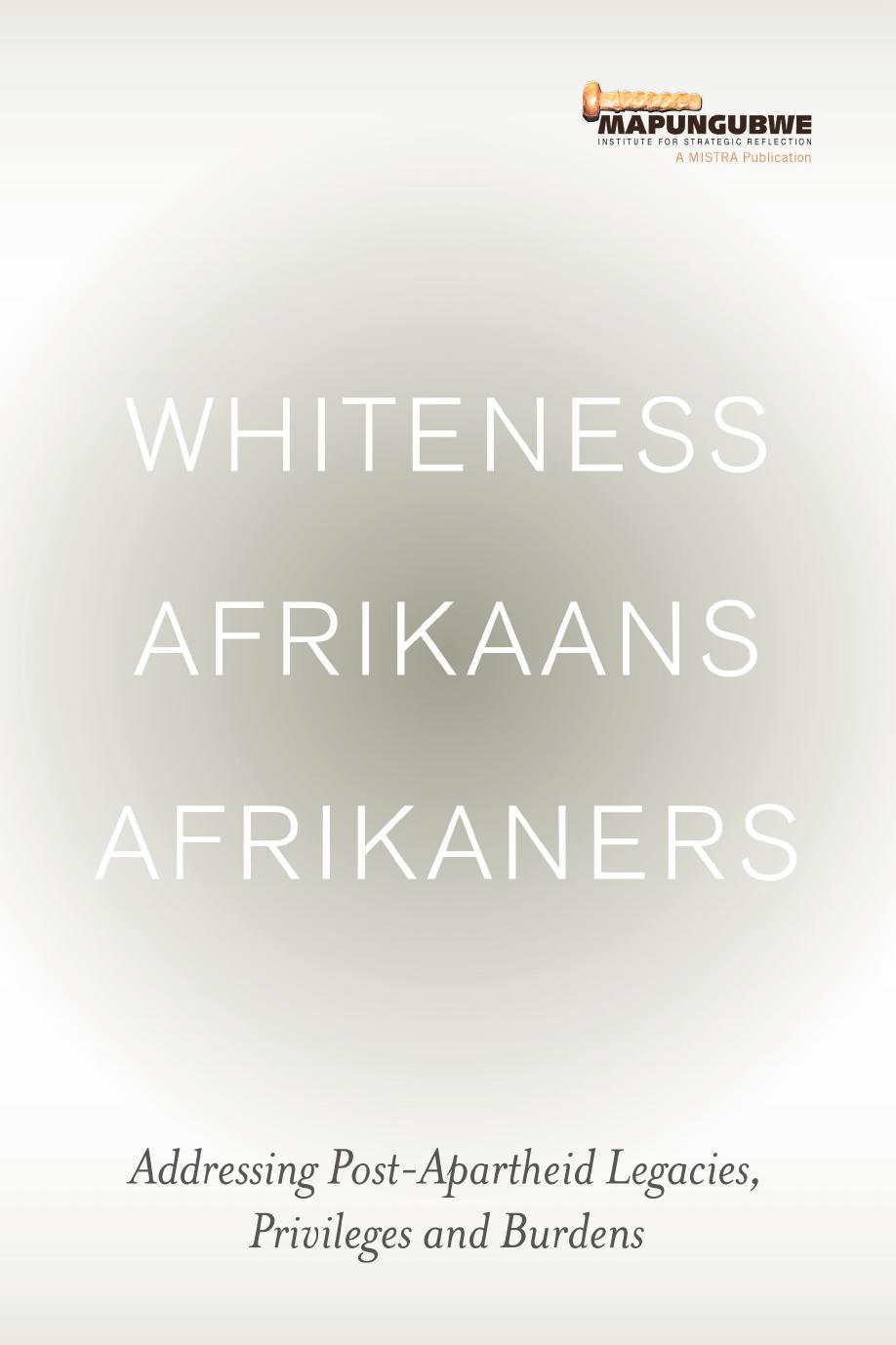Whiteness Afrikaans Afrikaners: Addressing Post-Apartheid Legacies, Privileges and Burdens by MISTRA MISTRA

Author:MISTRA MISTRA [MISTRA, MISTRA]
Language: eng
Format: epub, pdf
Tags: History, Africa, South, Republic of South Africa, Social Science, Discrimination & Race Relations
ISBN: 9780639923819
Google: GYeEDwAAQBAJ
Publisher: MISTRA
Published: 2019-01-10T16:09:36+00:00
Old and new structures
Part of what defines goodness in the new South African society is the bounty and beauty of the leisurely suburbs and urban centres from which black South Africans were excluded. Yes, the roads with pavements, the well-kept parks with wooden chairs, quaint bridges over miniature lakes, charming and shady trees, and lush fields which define this beauty. These features are inviting to all who yearn for a good, picturesque and even healthy lifestyle of afternoon strolls with prams and Saturday morning park runs. But they are not accessible to all.
A new kind of exclusion applies. Where the majority of South Africans were once excluded from this life by law, they are now excluded by financial means. Rising inequality has wrought havoc on the dream of a new South Africa of prosperity and access for all.
These parks, trees and pavements are of such importance in the modern and international society that they lend exclusionary value to surrounding homes.
This means that those who acquired homes in the suburbs before 1994 are reaping the rewards afterwards. The value of these has not only grown since 1994 simply because of parks, but because of what economist Kevin Lings (2014) referred to as the democracy dividend. This can be understood from the perspective that until South Africa was a democratic country it was closed and isolated from the rest of the world. Foreigners could not participate in buying South African assets. They could not bring their dollars to compete for the worth of homes in lush suburbs with parks. As economic theory has shown, competition is an important concept in the determination of value and price. The democracy dividend could thus be said to be the lever that released value compressed in a closed and repressive economic system without competition.
Further, the acceleration of such wealth and the size of the democratic dividend is a consequence of the initial or low base price of the property or home. First, the land on which the parks are built was easily and cheaply accessible to the minority as a result of the legal regime of exclusion. It was also low because the labour to develop and maintain it was cheaply supplied. Thus, members of white society could accumulate land (property) and its enhancing features and surroundings cheaply. Cheap land, cheap labour and no market forces of competition to pressure value and prices upward kept access open for whites. Relatively poor white people could afford houses then that they could never afford now under an open and competitive economy.
Download
Whiteness Afrikaans Afrikaners: Addressing Post-Apartheid Legacies, Privileges and Burdens by MISTRA MISTRA.pdf
This site does not store any files on its server. We only index and link to content provided by other sites. Please contact the content providers to delete copyright contents if any and email us, we'll remove relevant links or contents immediately.
| Anthropology | Archaeology |
| Philosophy | Politics & Government |
| Social Sciences | Sociology |
| Women's Studies |
Nudge - Improving Decisions about Health, Wealth, and Happiness by Thaler Sunstein(7693)
The Fire Next Time by James Baldwin(5431)
iGen by Jean M. Twenge(5409)
Adulting by Kelly Williams Brown(4566)
The Sports Rules Book by Human Kinetics(4379)
The Hacking of the American Mind by Robert H. Lustig(4375)
The Ethical Slut by Janet W. Hardy(4242)
Captivate by Vanessa Van Edwards(3838)
Mummy Knew by Lisa James(3686)
In a Sunburned Country by Bill Bryson(3537)
The Worm at the Core by Sheldon Solomon(3486)
Ants Among Elephants by Sujatha Gidla(3463)
The 48 laws of power by Robert Greene & Joost Elffers(3250)
Suicide: A Study in Sociology by Emile Durkheim(3018)
The Slow Fix: Solve Problems, Work Smarter, and Live Better In a World Addicted to Speed by Carl Honore(3007)
The Tipping Point by Malcolm Gladwell(2914)
Humans of New York by Brandon Stanton(2868)
Handbook of Forensic Sociology and Psychology by Stephen J. Morewitz & Mark L. Goldstein(2704)
The Happy Hooker by Xaviera Hollander(2686)
